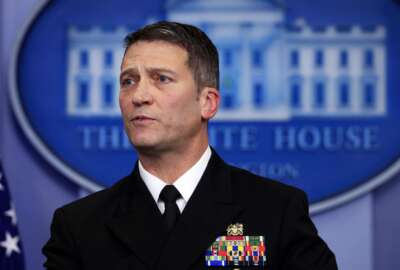
Diving instructor could be VA’s next sushi
Ronny Jackson, or whomever becomes the next Veterans Affairs secretary, might only succeed by clearing out the infighting senior staff.
If firing David Shulkin will result in a better Veterans Affairs Department, then great. But I for one am not confident it will.
Pity Rear Adm. Ronny Jackson, presuming he even survives the nomination process. That’s by no means a given. He’s a highly qualified physician. He was an instructor at the Naval Diving and Salvage Training Center. But he has scant experience managing something on the scale of VA. If he ends up at the top, perhaps he’ll prove an able administrator. Otherwise he’ll be eaten alive.
If confirmed to replace Shulkin, Jackson faces a long agenda he will not have set. Jackson would need to deal with the controversial Choice program for outside care, VA’s ungainly facilities inventory, and a multi-billion dollar project to replace its decades-old electronic health record. Plus VA has 40,000 job openings it’s been unable to fill.
No one except President Donald Trump really knows why Shulkin got tossed into the red sharps bucket. Ostensibly, it was over Shulkin’s trip to Europe last year and the costs it entailed. Published reports refer to “lavish” or “excessive” or “luxurious” spending. The so-called “optics” weren’t good. In Washington, optics matter more than reasoned analysis. The VA Inspector General’s report on the episode drew another popular Washington headline adjective: scathing.
Another possibility is that Shulkin was simply unable to impose his will on the other VA executives. That caused infighting, a surer killer of progress than strychnine.
Or maybe it’s because, as Henry Ford II famously said when firing Lee Iacocca, “Sometimes you just don’t like somebody.”
The key to success for the next VA secretary is both simple and cruel. It’s like taking over, I don’t know, General Electric. He’ll have to fire anyone who’s not with the program. Still pushing for Vista instead of the new EHR? Gone. Still uncomfortable with veterans getting outside care? Gone. Still reluctant to replace under-performing medical center directors? Gone. Clean house.
I remember when I was a senior vice president at a small company, a subsidiary of a bigger one. A new president was brought in. Luckily, we hit it off. But he spent a year gently but persistently probing for weak or recalcitrant sub-leadership. At the end of that year, life got noticeably more fun and focused on product. He mused, “Well, we got rid of all the a–holes.”
When you get below the political level, VA has many strengths. And by political, I don’t mean just the presidentially appointed. You know the political types when you see them. For the dedicated medical, research, technology, personnel and administrative staff to be fully effective, you’ve got to have unified leadership and unambiguous goals. That can’t happen if there’s a headquarters culture of Secretary-be-damned. I mean, how bad could Eric Shinseki, Bob McDonald and David Shulkin possibly be?
What’s the reality? VA will have had seven secretaries or acting secretaries in four years. No one — Congress or the White House — has established a clear and consistent roadmap for the Choice program. So the argument over purported privatization continues. Personnel and other practices after successive VA reform bills have yet to gel.
So, good luck to Ronny or whomever ends up as the next VA secretary. Thankless though it’s become, it’s an important job. It embodies an almost sacred trust between the country and a select subset of its citizens. It’s too important — to the veterans and to the really good people at VA — to go on like this.
Copyright © 2025 Federal News Network. All rights reserved. This website is not intended for users located within the European Economic Area.
Tom Temin is host of the Federal Drive and has been providing insight on federal technology and management issues for more than 30 years.
Follow @tteminWFED






